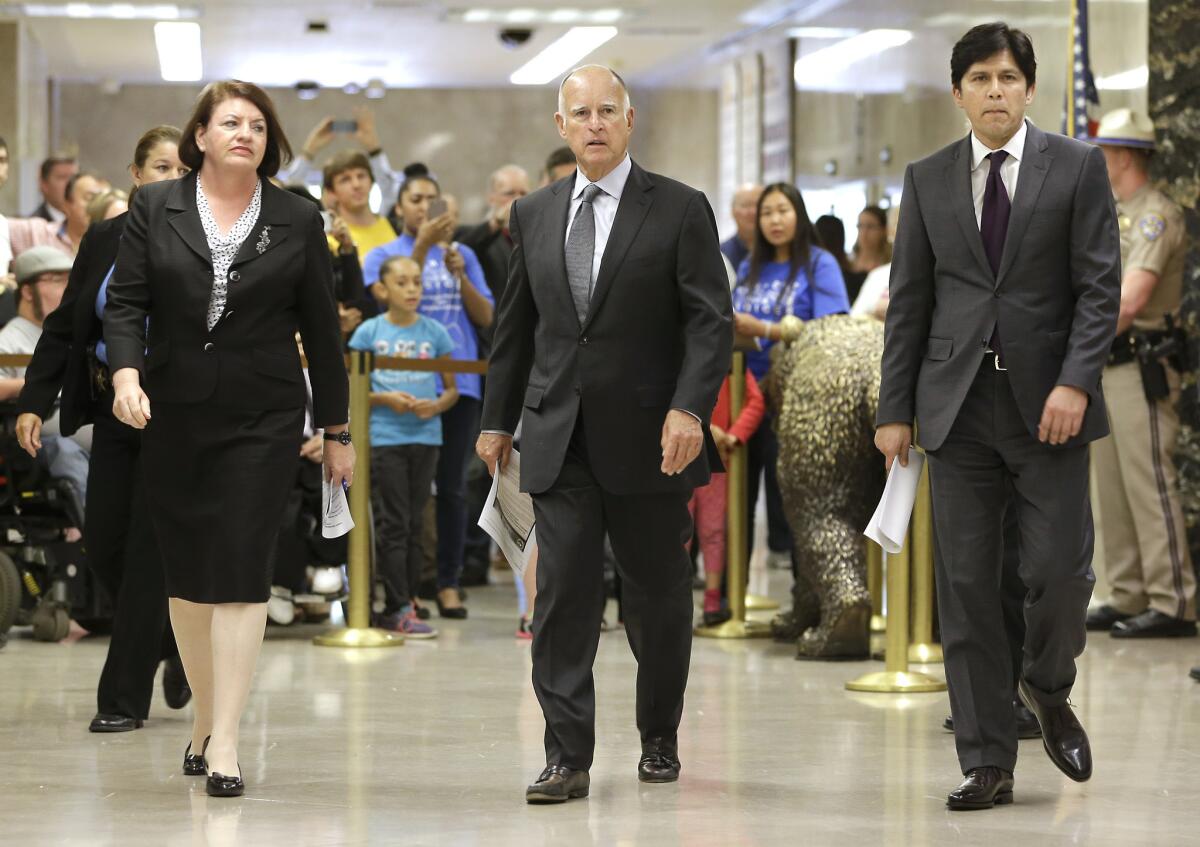Governor, top lawmakers ready to modify climate change measure as negotiations continue

Assembly Speaker Toni Atkins (D-San Diego), Gov. Jerry Brown and Senate leader Kevin de León (D-Los Angeles) have been working to reach an agreemment on sweeping legislation intended to fight climate change.
Reporting From Sacramento — Facing resistance from even some fellow Democrats, Gov. Jerry Brown and legislative leaders were scrambling Tuesday to find a compromise on a controversial bill that embodies some of the governor’s most ambitious environmental goals.
With the end of this year’s legislative session set for Friday, Brown’s senior aides have been holding private meetings to hash out final details on the measure, intended to slow climate change by slashing gasoline use on state roads, increasing energy efficiency and boosting renewable energy in California.
Possible modifications, reviewed by The Times and described by Capitol sources, would impose new limits on environmental regulators and alter the approach to cutting the volume of gas burned by California drivers.
The changes have not been formally introduced. And it is unclear whether they will satisfy holdouts in the state Assembly — the Senate has passed the bill — especially amid a fierce opposition campaign from the oil industry. Sources declined to be identified while the tense negotiations were in progress.
Evan Westrup, a spokesman for Brown, declined to discuss specifics.
“There are a number of proposals floating around,” he said. “That’s what negotiations are all about.”
Assemblyman Reggie Jones-Sawyer (D-Los Angeles), who has not taken a position on the legislation, said there have been “very productive” meetings.
“Everyone that I know tried to lay out a path to a ‘yes,’ ” he said.
The gas reduction, which could affect the kind of fuel pumped by drivers and the vehicles they buy, has proved the most controversial element of the bill. Business interests that oppose the measure hold more sway in the Assembly than in the Senate, which is led by the bill’s author, Democrat Kevin de León of Los Angeles.
Some lawmakers want more influence over how the California Air Resources Board, a powerful regulatory agency, develops plans for meeting the gasoline goals. Oil companies have asserted that the bill, SB 350, would empower state bureaucrats to ration fuel or implement other onerous restrictions.
Potential changes in the legislation would address some of these concerns. For example, regulators could be prevented from rationing gasoline or restricting the days when Californians could drive, steps that board officials said were not under consideration.
The bill could also be adjusted to emphasize regulators’ ability to meet the new goals with existing policies — for example, by reducing the carbon content of fuels, increasing the availability of biofuels, implementing vehicle efficiency standards and increasing mass transit.
More changes could be made in how the state measures progress in lowering gasoline consumption.
The original legislation called for a 50% cut in petroleum use by 2030. A proposed revision would replace that goal with an equivalent target for reducing greenhouse gas emissions and other pollutants from gasoline-powered transportation.
Such a change is intended as a more flexible approach that could still lead to less petroleum consumption and cleaner air.
Negotiations are expected to continue as the clock ticks toward Friday.
“It’s getting there,” said Assemblyman Jim Cooper (D-Elk Grove), one of the lawmakers who has voiced concerns about the bill and has been a target of oil industry lobbying. “There’s still more work to do.”
Cooper is one of several minority lawmakers whose constituents include low-income Californians wary of higher costs that could come with new regulations. The legislators’ votes could prove pivotal.
Meanwhile on Tuesday, a separate measure, SB 32 by Sen. Fran Pavley (D-Agoura Hills), stalled in the Assembly.
It would codify in state law long-term targets for reducing greenhouse gas emissions that were set by Brown and his predecessor, Gov. Arnold Schwarzenegger, in executive orders.
Pavley said she expected another vote later this week after lawmakers had reviewed changes she had made in an effort to draw wider support.
Modifications include a proposed post on the Air Resources Board for someone representing low-income communities with pollution problems. The potential amendment could address concerns from lawmakers who feel regulators don’t pay enough attention to troubled areas of the state.
Twitter: @melmason
Follow @chrismegerian for more updates from Sacramento.
More to Read
Sign up for Essential California
The most important California stories and recommendations in your inbox every morning.
You may occasionally receive promotional content from the Los Angeles Times.












